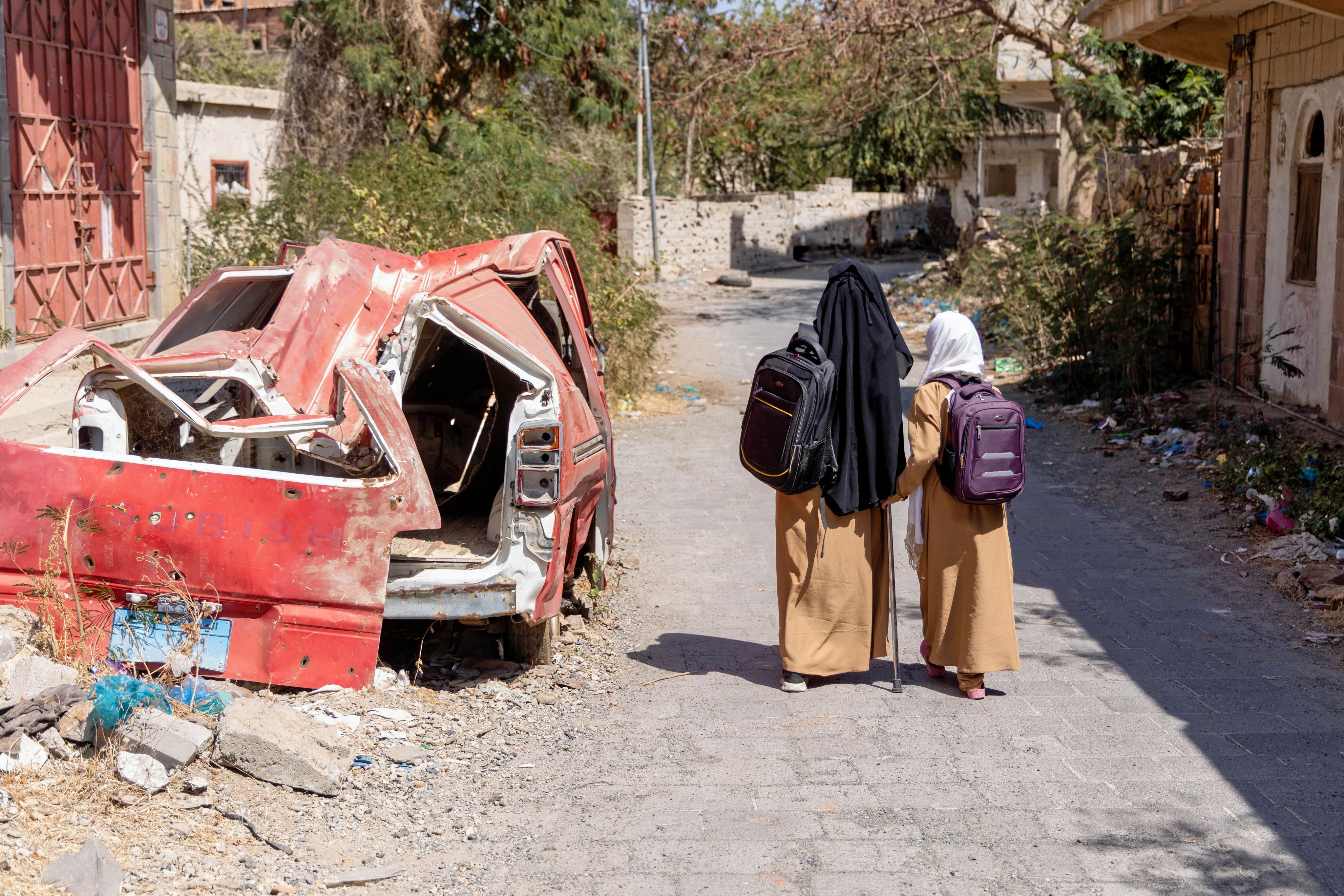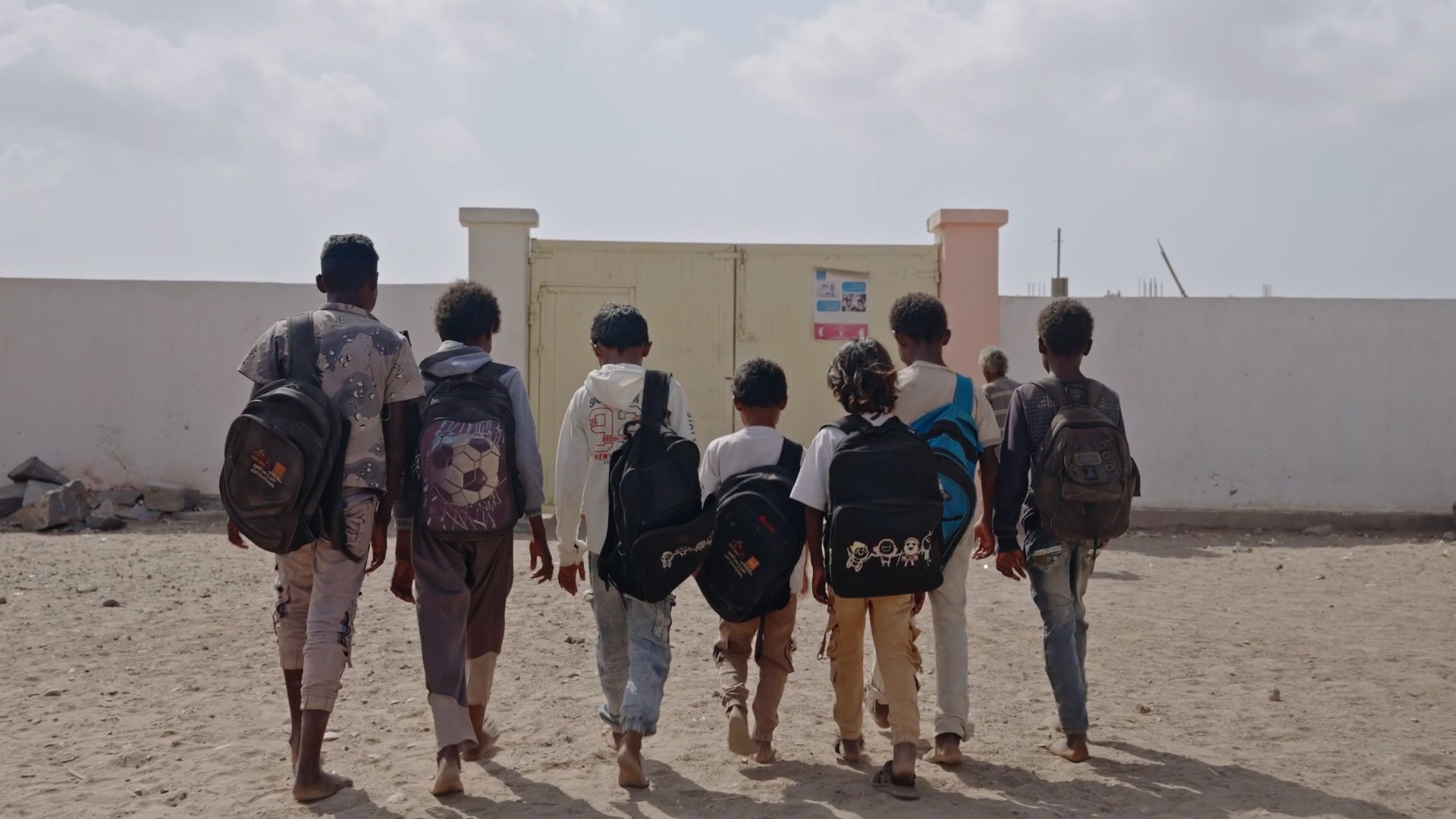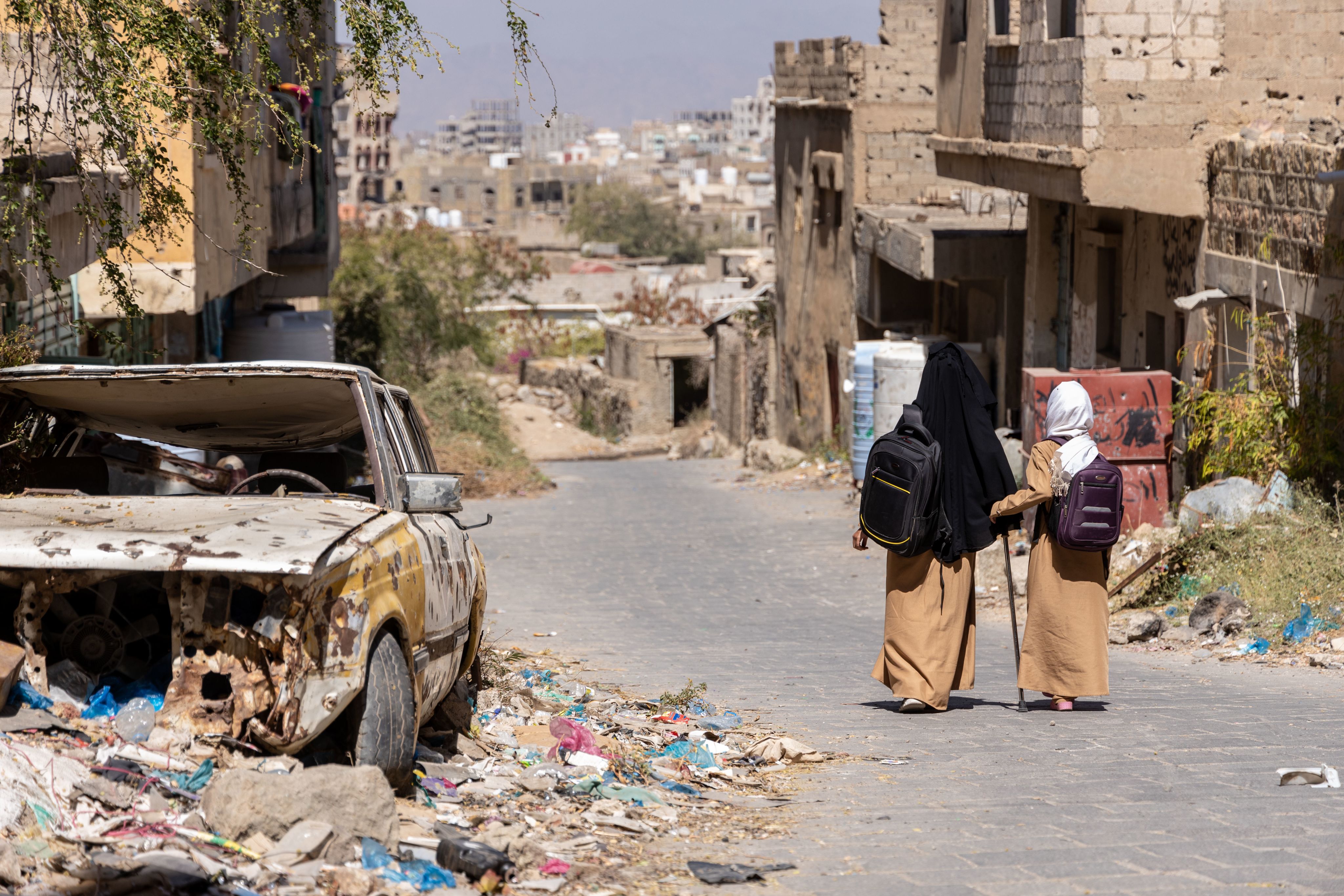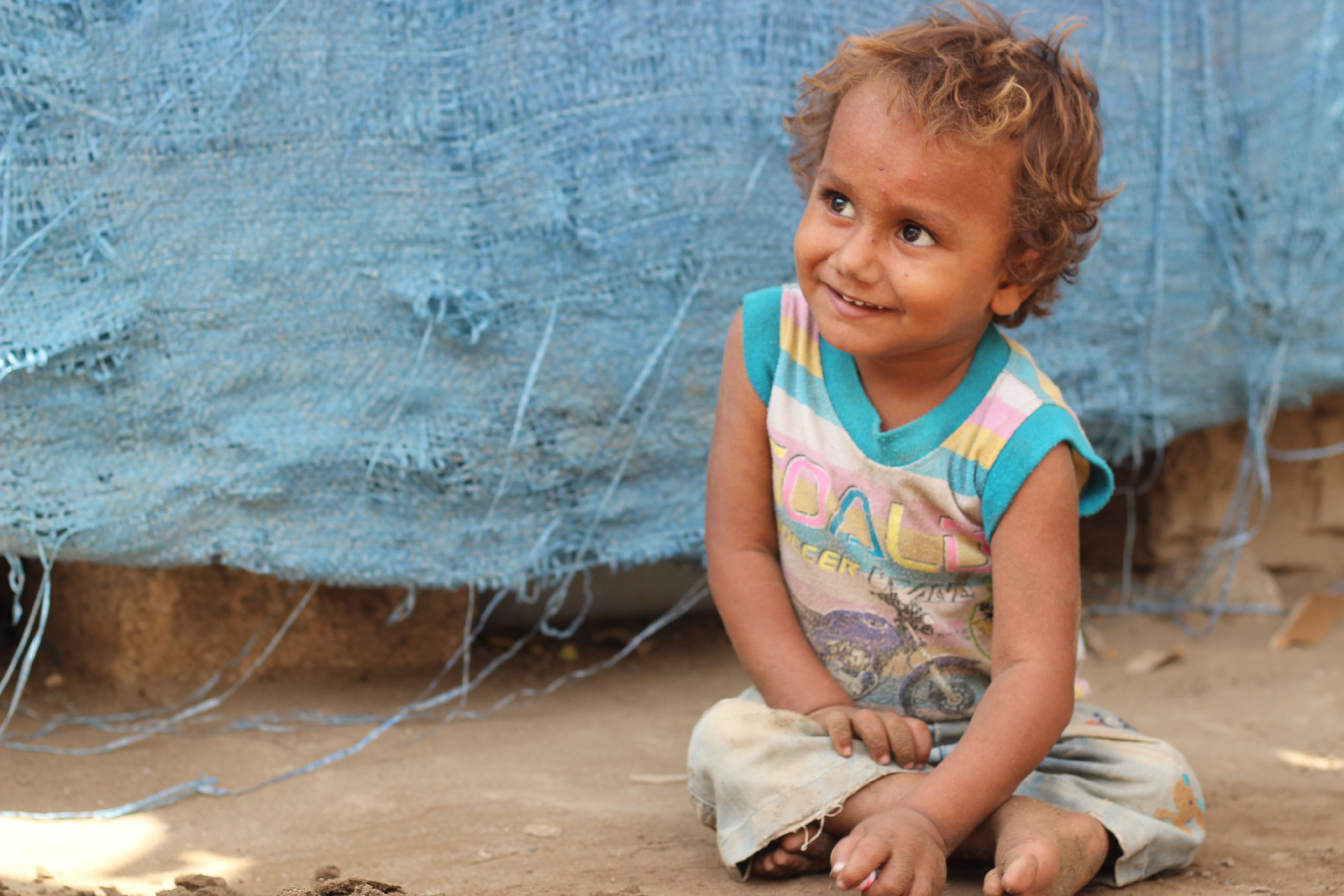What is happening in Yemen?

Nine years of war in Yemen have left more than 18 million people – over half of the population – in desperate need of protection and life-saving assistance.
Thousands of children have lost their lives and suffered life-altering injuries. They have been forced from their homes – many, multiple times – cut off from food, healthcare, and other essential services. Nearly half of all children under five are now facing malnutrition. And 2 in 5 children are out of school..
Recent regional conflict dynamics have exacerbated the situation. The impact of the security threat in the Red Sea is hampering aid efforts, as disruption to trade is pushing up prices and causing delays in shipments of life-saving goods.
Over the past nine years, many children have lost everything. Some carry their favourite, toy or book, others a blanket.
But you can’t carry security, a stable income, a safe place to play or learn, or someone to fight for your rights. That’s what Save the Children is there for.
We’re there before, during, and after a crisis.

The struggle for education
HANGING IN THE BALANCE
With the war entering its tenth year, the impact on children’s learning and well-being is severe.
Today, over 4.5 million children in Yemen are out of school, constituting 39 percent of the country's school-age population. This figure raises serious concerns not only about the well-being and future of those children, but also about the future of the entire country, as education is a vital pillar of the country's potential for recovery.
The challenging economic situation in Yemen, which has been a major contributor to the crisis in education, has also increased protection risks, with parents and caregivers adopting harmful coping mechanisms, such as child labour and child marriage.
READ MORE: For full details of the challenges facing children's education in Yemen, see Save the Children's report, Hanging in the Balance: Yemeni Children's Struggle for Education


The war has left behind a deadly legacy of explosive ordnance in Yemen, which poses another significant threat to children. Last year, more than half of the 284 children killed or injured in Yemen were due to landmines and UXOs (unexploded ordnances).
Save the Children’s report, “Watching Our Every Step”, analysed data from 2018 to 2022 and found that one child was killed or injured on average every two days in Yemen by landmines or other explosive devices.
Maha*, 10, is just one of many survivors.
Landmine survivors
MAHA'S* STORY
Maha*, 10, has lived with her family – including her 16-year-old sister Maya* – in Taiz, Yemen since being displaced from her village due to conflict.
In October 2022, the sisters’ lives were changed forever when they stepped on a landmine while collecting firewood for cooking. Even though Maha* was rushed to hospital for surgery, she lost her left eye and had her right hand amputated. In addition, Maha* injured her right leg and Maya* broke her left leg.

Maha*, 10, holding a picture that she drew during a workshop for injured children organised by Save the Children. Photo: Ahmed Albasha / Save the Children.
Maha*, 10, holding a picture that she drew during a workshop for injured children organised by Save the Children. Photo: Ahmed Albasha / Save the Children.
Maha* loves going to school, however, the incident has made doing so difficult. Maha* has been able to attend a workshop for injured children organised by Save the Children and, as she has recovered, has started going to school again alongside her sister using crutches.
If I could write a letter to the most powerful person in the world, I would tell him: stop the war.”
Looking forward, Maha* wants to become a doctor so that she can help children who have been impacted by landmines too.
READ MORE: How children are overcoming climate change, conflict and other crises to continue learning


There are an estimated 17.8 million people in need of health support in Yemen – over half are children.
5 million children need life-saving nutrition support, with 2.4 million in need of treatment for acute malnutrition.
Malnutrition survivor
NUSAIR'S* STORY
When Nusair*’s family were displaced due to conflict in Yemen, his mother Suad* didn’t have enough money to buy him nutritious food. He soon suffered from malnutrition.
Before he was skin and bones and he was weak.”
Nusair* was treated at a Save the Children supported clinic. Now three years old, he has made a full recovery.

Nusair* with his mother Suad* at home in Yemen. Photo: Abdo Al Dhawi / Save the Children.
Nusair* with his mother Suad* at home in Yemen. Photo: Abdo Al Dhawi / Save the Children.
My baby now is healthier and normal like any child after medical support provided by Save the Children.
After having lunch, he loves to play with his friends. He likes to go out with his father everywhere and he loves to ride his bicycle.

What is Save the Children doing in Yemen?
Save the Children has been working in Yemen since 1963. When the conflict in Yemen started in 2015, we significantly increased our humanitarian response.
In 2023 alone, we reached 2.3 million people, including 1.5 million children with life-saving interventions.
Save the Children is currently working in 11 governorates, with a focus on four main pillars:

Children in Yemen paint a mural on the walls of a school as part of the Flowers for Children campaign. Photo: Al-Baraa Mansoor / Save the Children.
Children in Yemen paint a mural on the walls of a school as part of the Flowers for Children campaign. Photo: Al-Baraa Mansoor / Save the Children.
EDUCATION
We tackle the barriers that can reduce children’s access to education through measures including:
- The provision of non-formal education to children out of school.
- Supporting children at risk of dropping out.
- Supporting teachers’ professional development.
- Providing learning materials, cash and voucher assistance to families to help them overcome the financial barriers that keep children out of school where feasible.

Safa'a, 6 months, is fed by her mother Samah at a Save the Children supported health centre in Taiz, Yemen. Photo: Save the Children.
Safa'a, 6 months, is fed by her mother Samah at a Save the Children supported health centre in Taiz, Yemen. Photo: Save the Children.
HEALTH
Our health and nutrition response focuses on effective and evident child survival and health interventions plus safe access to water, sanitation, and hygiene and emergency food or cash assistance to ensure a healthy start in life for affected children.
In addition to providing basic health services, we also focus on neonatal care, reproductive health for women, and treating children who have been injured or maimed by the conflict.

Children playing at a Save the Children supported social centre in Taiz, Yemen, where children and young adults play games and learn new skills. Photo: Save the Children.
Children playing at a Save the Children supported social centre in Taiz, Yemen, where children and young adults play games and learn new skills. Photo: Save the Children.
PROTECTION
The work of our child protection response falls under two areas: preventive and responsive.
We work with the Ministry of Social Affairs and Labour to integrate child rights and child safeguarding, case management, and psychosocial support into social workers' agendas.
We also support community-based initiatives to strengthen the local community’s ability to respond to the protection needs in its own area.
READ MORE: Discover the power of a safe place to play

40-year-old Sama, a mother of four, in a sewing lesson at a Save the Children supported community centre in Taiz, Yemen. Photo: Al-Baraa Mansoor/Save the Children.
40-year-old Sama, a mother of four, in a sewing lesson at a Save the Children supported community centre in Taiz, Yemen. Photo: Al-Baraa Mansoor/Save the Children.
RESILIENCE
We work to enhance the resilience of vulnerable children and their families by improving household income through:
- Providing conditional and unconditional cash assistance.
- Creating sustainable livelihood opportunities such as small holder farming.
- Enabling access to health, nutrition, water and learning services.
- We also support the rehabilitation and construction of livelihood assets and public institutions (including health facilities, community water systems, and schools).
How you can help
The situation in Yemen is dire and people’s resilience has been stretched beyond their capacity to cope. More than 18 million people urgently need life-saving aid to survive, and without a substantial increase in funding and efforts to agree a lasting peace deal, millions of children in Yemen are at risk.
But you can help. Here are 3 simple actions you can take right now:
- Spread awareness. Tell people about what’s happening to children and their families in Yemen to ensure they are not forgotten.
- Share this story with your friends and family using the social share buttons above.
- If you're able to, please donate to Save the Children to help children in Yemen and across the world.
